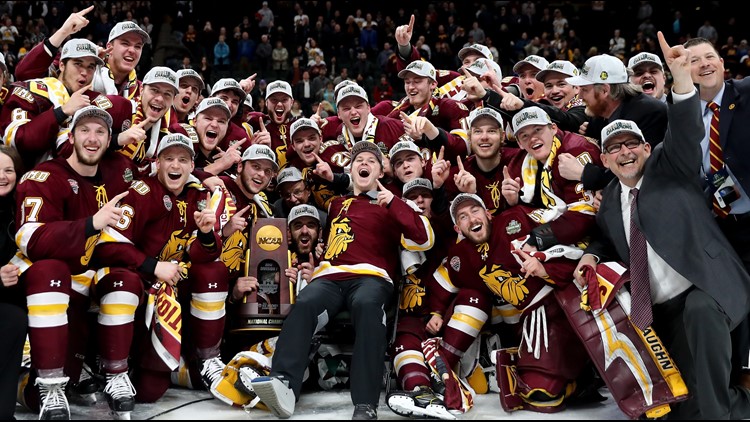A brand is a name, term, design, symbol, or other feature that distinguishes an organization or product from its rivals in the eyes of the customer. Brands are used in business, marketing, and advertising.
Wikipedia
Culture is the social behavior and norms found in human societies. Culture is considered a central concept in anthropology, encompassing the range of phenomena that are transmitted through social learning in human societies.
Gaining, resulting in, or relating to victory in a contest or competition.
"a winning streak"
Kind but courageous, friendly but dignified, the Bulldog is a thick-set, low-slung, well-muscled bruiser whose “sourmug” face is the universal symbol of courage …


A month removed from winning the NCAA Division-1 Championship, University of Minnesota Duluth Men’s hockey coach Scott Sandelin says his phone isn’t ringing any more than usual. Sandelin also confirmed that he hasn’t been invited to address a single business group, much less deliver a “TED talk” to a global audience.
I believe this is a serious mistake.
In an age when business seeks to emulate successful sports teams, and successful sports teams are increasingly trying to gain an edge by studying iconic business models... Sandelin, a soft-spoken Hibbing native, is clearly on to something.
“I’ve learned to be a bit more flexible in some things but the philosophies and values of what we want in our program never change”, says Sandelin. “I think that’s an important thing that we’ve tried to stay true to, or at least I have as a coach, and I think communication is a big part of it. Being fair, being honest, you know, all those things that go into trying to create that culture that you want to have here.”
Words like fair and honest may seem old-fashioned, but when applied “authentically” (which is a business buzz word right now) they appear to not only be a very effective way to build a winning culture, but also to communicate with Sandelin’s elusive “target group” of males, ages 13-23.
“I think it’s important that they have that communication and it doesn’t always have to come from me, the head coach, but I think it’s important that they get some feedback”, says Sandelin. “Sometimes it’s hard because the message can be redundant. You’re saying the same things because you just want the kids to understand, but for me as a player, that was a good learning lesson.”
A Hobey Baker finalist at the University of North Dakota, Sandelin was a second team All-American, All-WCHA First Team defenseman and the MVP of the Fighting Sioux. After a seven-year NHL career Sandelin returned to Grand Forks, this time as a coach.
“I think I was pretty lucky to work for Dean Blais in North Dakota” says Sandelin. “He gave me an opportunity and we had a lot of success there. It was a great team effort and I have a ton of respect for Dean and I learned a lot from him. I think the success we had in the six years I was there allowed me to get the interview and kind of get my foot in the door here at UMD.”
Despite leading the Bulldogs to six 22-plus win seasons, eight NCAA tournament appearances, four “Frozen Four” appearances and two national championships, Sandelin is quick to credit others.
Interspersed in every answer Sandelin gives are references to Blais, his assistant coaches (both current and past) and the support staff at the University of Minnesota Duluth. The school of just under 12,000 is now on even-par with every traditional super-power in men’s hockey including their much larger neighbor to the south, the Twin Cities-based University of Minnesota.
“I think it says a lot about where our program has come and maybe where it’s at”, says Sandelin. “Obviously, a lot of credit goes to my staff who are out on the road, recruiting the type of players that we want here, and obviously we all share that, but those guys do a tremendous job because those things are the life blood of your program and I’m fortunate to be around a lot of great people.”
What made me especially interested in speaking with coach Sandelin is that this was supposed to be a “rebuilding year” year for the Bulldogs, who lost in the NCAA championship game just a year ago. Not only did the Bulldogs lose seven players to graduation, they also lost their starting goalie and their top returning scorer to the NHL. Bottom line, they lost roughly half their team from one season to the next.
“Sitting down with our captains and having some really good discussions, in July and really throughout the first half of the year, about how to get this group figured out and kind of navigate through all that stuff, but I thought they did an outstanding job.” Says Sandelin, “We had some frustration at times, but those guys really helped figure that out, and in the second half our discussions were minimal.”
Overcoming a slow start, the Bulldogs integrated a large freshmen class and managed to stay competitive in the ultra-competitive NCHC conference. Naturally, Sandelin gives the credit for that to somebody else.
“The captains kind of took the bull by the horns and they were the leaders, and I think that was really fun to watch as those guys grew through that too. We went through some adversity and I think those things are good for your team,” Sandelin asserts. “It pulled us together and we had a really good second half and built some confidence and we won our last four games, and that’s the most important thing.”
In the big business version of “Which came first, the chicken of the egg?”, does culture breed success? Or in Sandelin’s case, do you recruit players (a process that now begins when boys are 13-14 years old) based on their character, or do you develop that character once they arrive on campus?
“Number one, they’re going to be a team guy first, and I think that’s critical. They’re going to work hard and the other part of that is I want them to come in here expecting to win. Those are three things I think are really important,” Sandelin maintains. “People talk about culture a lot. It takes time to get that. Sometimes that culture can get sidetracked and I know I’ve been through that as a head coach. I think sometimes that it’s just recruiting a good character kid, but we’ve been fortunate the last 5-7 years, we’ve had tremendous captains, good leadership groups and when you have that as a coach obviously it makes your job easier.”
So, what is it that Sandelin is looking for in a player, and what does he want his players to know before they pull on a Bulldog sweater?
“I want our kids to be competitive, hard-working, really difficult to play against”, says Sandelin. “But I want them to be humble and to always represent the program in the right way, and I think those are important things.”
Also important? The message Sandelin and his staff will send to this year’s group. They’re, well aware that the Bulldogs finished 3rd in the NCHC last season, failing to win a game in the conference tournament before catching lightning in a bottle and winning the NCAA crown as the last team to qualify for the field.
“That’s the big thing, it’s a new year and there might be references to it, but it can’t necessarily be at the forefront because it’s a totally new year and you’re going to have different players. Hopefully our younger guys don’t think that that was the pinnacle. Hopefully they’re hungry to do it again and creating that level of desire to do it again is going to be our challenge as a coaching staff,” said Sandelin.
Sadly, it's a challenge that doesn’t seem likely to be sidetracked by business speaking requests for the humble head coach. Businesses looking to succeed may want to rethink strategy, and give Scott Sandelin a call.
ADDDENDUM
Before you come at me about the situation involving former UMD women’s hockey coach Shannon Miller (who was recently awarded $3.74 million dollars as part of a discrimination and retaliation lawsuit against UMD), I’m not trying to suggest that all is fair and equitable in Duluth or elsewhere.
In full disclosure, I never asked coach Sandelin about the Miller situation, nor did I intend to. I didn't ask Sandelin about his relationship with Miller, the way the two programs are or may have been treated by the school’s administration, or his thoughts on the outcome of the trial. That’s content for a larger discussion at another time.
What interested me as someone who grew up in these parts, attended school and worked in the sports media in Duluth (and as an entrepreneur who is keenly interested in both sports and business culture), is how Sandelin has been able to change the culture, raise expectations, and win not one, but two national championships during his tenure with the Bulldogs.
Thanks for reading.


